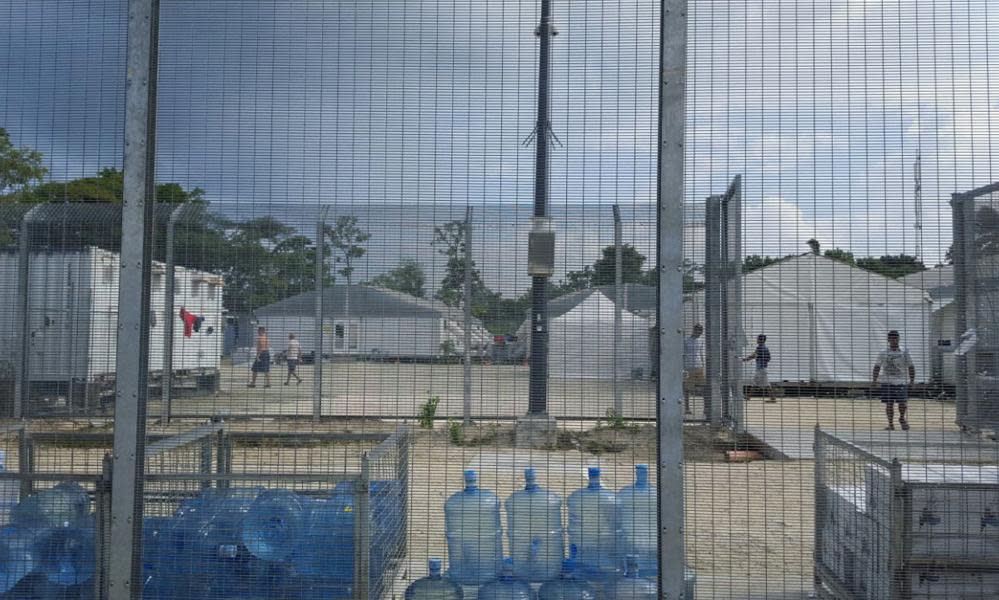Manus Island closure: refugees forced out of compound and threatened with arrest

Refugees and asylum seekers have been forced out of one of the largest compounds of the Manus Island immigration detention centre and threatened with arrest as part of the rolling closure of the facility.
A letter, seen by Guardian Australia, informs those who are in the Foxtrot compound that they have until the end of Tuesday to vacate. Immigration officials and police were also seen visiting refugees and asylum seekers to inform them verbally, one detainee said.
“The ceasing of water, power, and cleaning services within Foxtrot is imminent,” it said. “Resident who elect to remain in Foxtrot compound upon water, power, and cleaning services are ceased [sic] are personally liable for any risk associated with residing in or entering Foxtrot compound.
“All residents are required to move effective immediately.”
The letter then tells detainees they may be in violation of Papua New Guinea law if they refuse, and that any attempt to “occupy without consent” is subject to legal action and will be reported to PNG police, alongside any other “noncompliance or potentially illegal action”.
Four years after the offshore processing regime was restarted, the Manus Island centre is being closed with many of the detainees still inside. The Australian and PNG governments have determined it will be completely shut down by 31 October, after the PNG supreme court ruled it was illegal. Officials have been withdrawing basic services in different sections to force people out.
Those detainees with refugee determinations have been told they can stay at the East Lorengau transit centre, or can temporarily relocate to one of the other detention centre compounds until they too are closed.
Non-refugees are being housed in Mike compound, but Guardian Australia understands not all of the estimated 150 men have moved there. Other compounds are already overcrowded, detainees have said.
“The government is determined to close detention and is increasing pressure on the refugees,” said detainee and Kurdish Iranian journalist, Behrouz Boochani.
“On the other side the refugees are determined to resist and don’t want to leave detention. It seems the government does not have any other option but to force people. I’m really worried the government will use force and make violence in coming weeks.”
Detainees have frequently expressed concern at the closure plan, saying they are not safe in the transit centre or the PNG community.
They are still waiting to learn if any will be accepted into the US under a deal struck between Malcolm Turnbull and former US president Barack Obama.
The US hit its quota for this year’s refugee intake this month, and officials reportedly left Manus and Nauru mid-interviews. The new intake doesn’t begin until October.

Earlier this week a letter signed by the men detained on Manus accused the Australian government and all opposition parties of “using us as un-uniformed soldiers to so-called protect your borders”.
The letter gave Australian officials the same 159-day “countdown” as the centre’s closure to “find a safe country for us and send us out of this country directly from this detention prison, or we are not moving anywhere”.
“We are not going to fight and we are not going to cause any unrest. We are powerless and weak,” it said.
“You have the army, the police and all of the necessary manpower and equipment. Bring them here and we will line up so you can shoot us to end our misery if you want to force us out.”
It comes amid an international spat between the UNHCR and the Australian government, which the former has accused of reneging on a verbal agreement over refugee resettlement.
Volker Türk, the assistant high commissioner for protection within the UN’s refugee agency, said the Australian minister for immigration, Peter Dutton, had agreed to allow for “compelling humanitarian cases” of family reunification for people on Manus or Nauru with relatives in Australia, in return for the UNHCR’s assistance on the US deal.
The UNHCR had identified 36 cases it wanted to present out of more than 2,000 refugees and asylum seekers held offshore.
The Australian government has maintained no one will be coming to Australia.
Unicef Australia has welcomed the US deal but was deeply concerned about children on Nauru with family in Australia.
“Family unity is one of the most fundamental principles in international law,” the organisation said.
“Yet Australia’s offshore processing arrangements have fractured a number of families for four years, and may now cause permanent separation for children and their loved ones, who have already experienced severe grief and trauma.”

 Yahoo News
Yahoo News 
